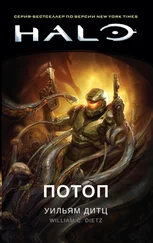So she made her way from place to place, checking and rechecking. Were the soldiers in Overman’s company carrying extra water? There wouldn’t be any at the airfield in Texas, and what if they had to fight the following day? Each soldier could need eight or nine bottles of water. Then there was the question of ammo. Should the Strykers carry more than they usually did? Hell yes, they should.
And what if the so-called “package” was wounded? Or a special operator for that matter? Mac ordered Quick to identify the best medic in the battalion and assign him or her to the ops team. On and on it went until Yankee Two arrived. It was completely dark by that time, but the runway lights were on as the cargo plane touched down. Sheets of rainwater flew to the right and left as the C-130 came her way. Olinger was standing at Mac’s side, holding a small recorder. “What’s so special about that kind of plane?” he wanted to know.
“They have a range in excess of two thousand miles loaded,” Mac replied, “and they can cruise at something like 360 mph. But their real claim to fame is that they can land on an unprepared field like the one in Pyote.”
If Olinger said something, his words were lost in the roar as the C-130’s pilots put all four engines into reverse, and the plane slowed dramatically. As soon as Yankee Two cleared the runway, Three came in for an equally noisy landing. It was still taxiing away when someone touched her arm. “Hey, Mac, we meet again.”
Mac turned to find that Thomas Lyle was standing beside her. But now, rather than a butter bar, he was a first lieutenant. “Thomas! Are you running the special ops team?”
“Cory Olinger,” the reporter interjected. “ New York Times. Could I have your full name please?”
“No, you can’t,” Lyle replied. “Nor can you name any of the people on my team. Not unless you want to wind up in some deep shit. Tom will have to do.”
“Tom?” Olinger inquired. “Not Thomas?”
“My mother is the only person who calls me Thomas,” Lyle replied. “My mother and the major here.”
“So the two of you have served together before?”
“That’s classified,” Mac said. “Turn the recorder off, Mr. Olinger. Or I’ll have one of my men confiscate it.”
Olinger looked hurt. “I’m just doing my job.”
“So are we. Turn it off.” Olinger obeyed.
Mac took Lyle aside. “So, Tom, what do you think?”
“The mission looks good on paper,” Lyle replied cautiously.
Mac smiled. “So you’re worried.”
“Exactly.”
“Me too.” They laughed.
“I suggest we run this like the Revell snatch,” Lyle said. “I’ll handle the grab… The rest of it belongs to you.”
“That works for me,” Mac replied. “I’m giving you my best medic. Please make her feel welcome.”
“We will,” Lyle promised. “Are you coming with us?”
“Of course I am… Somebody has to keep an eye on you.”
“Thanks, Mom. If anyone can get us in and out, you can.”
“I’ll do my best. Who’s the target?”
“The Confederacy’s Secretary of Energy. Some dude named Oliver Sanders. He’s the one they put in charge of siphoning oil out of the petroleum reserves and selling it.”
Sloan, Mac thought to herself. This has Sloan written all over it. Does he know that I’ll be part of the team that’s going after Sanders? And if so, how does he feel about that?
The question, like so many others, went unanswered. “Come on,” Mac said. “We have work to do.” The rain continued to fall.
CHAPTER 11

Coyote is always out there waiting, and Coyote is always hungry…
—NAVAJO PROVERB
NORTH OF TIJERAS, NEW MEXICO
The long, cold night was coming to a close, and the President of the United States was sore. He’d been riding for the better part of two days by then, and even though his parents had horses, he hadn’t ridden in years.
His mount was a huge but good-natured brute named Kenny. He had only one fault, and that was to veer off the trail every once in a while, in hopes of nibbling on whatever greenery was available. Fortunately for Sloan, the horse didn’t get many opportunities because of New Mexico’s semiarid countryside.
The presidential party consisted of six people, including a Navajo named Joe Akalii (Cowboy) who led the way, Major Sam McKinney in the two slot, Sloan, and three Green Beret bodyguards, all of whom were suffering silently.
But even though the group was small, it could call on a lot of firepower. A Predator drone was circling high above, two A-10 Warthogs were flying lazy eights fifty miles north of their position, and a Black Hawk helicopter was parked on a mesa twenty miles away.
The purpose of the trip was to free Albuquerque from the Confederates. Sloan couldn’t bring in troops to capture the city without weakening the line elsewhere. But what he could do was sponsor a resistance movement aimed at cutting the rebel supply line, which ran up from Texas and into Albuquerque.
He couldn’t phone the request in, however. Not according to people who knew the area. No, if Sloan wanted to bring the Navajos on board, he’d have to show some nation-to-nation respect. And that meant a meeting with Chief Natonaba, a much-respected leader, who could cut a deal if he thought it was in the tribe’s best interest.
But would he? According to Congressman Velasquez, who represented Albuquerque, Natonaba had a very Navajo-centric view of the world. “Don’t promise anything you can’t deliver,” Velasquez had cautioned. “Natonaba has a long memory. He talks about the Scorched Earth Campaign of 1863 as if it took place yesterday.”
After looking it up, Sloan discovered that 1863 was the year Kit Carson’s troops forced Navajo captives to march 350 miles to Fort Sumner. Many of them died along the way.
Sloan’s train of thought was interrupted as the horse in front of Kenny came to an abrupt halt causing his mount to do likewise. And when Sloan saw McKinney dismount, he was quick to do likewise. His butt was sore, and so were his knees. “Joe will take care of the horses,” McKinney said. “We’ll go forward on foot. Bring your rifle just in case.”
Sloan was wearing a tac vest, his tac vest, meaning the one he’d worn in Richton. And he was carrying the same M4. He nodded as Joe went about the business of leading the horses in under a rocky outcropping, where they would be less visible from above.
Once the horses were secure, McKinney led the rest of the group forward. As the trail wound its way around the side of a hill, a sickly-looking yellow blob rose in the east. It was barely visible through a veil of particulate matter. But by the time the presidential party arrived on a flat area on the south side of the hill, there was enough light to see by.
A large water tank occupied the center of the site. Sloan could tell that the name TIJERAS had been painted on it even though the E and the R had been obliterated by a jagged hole. An artillery shell perhaps? Something like that.
Gravel crunched under their boots as the men advanced. When they were about fifty feet away from the tank, a man stepped out into the wan sunlight. He was wearing a flat-brimmed hat, a sheepskin coat, and a pair of ancient chaps. The M16 was barrel up and resting on his right shoulder. His eyes were focused on McKinney. “President Sloan, I presume?”
“Nope,” McKinney replied. “That would be the gentleman behind me. Please place the assault weapon on the ground and take a step back. Are you carrying a pistol? If so, place that on the ground as well.”
Читать дальше
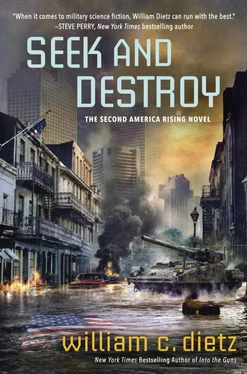

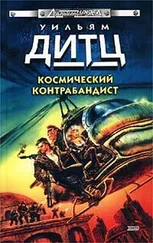
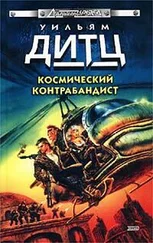
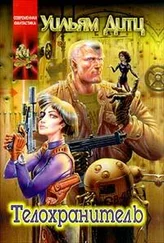
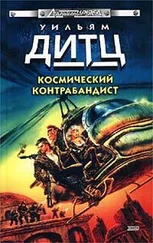
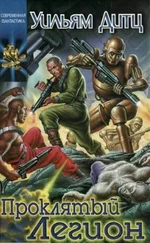
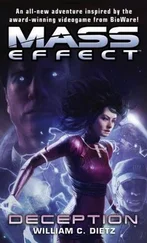

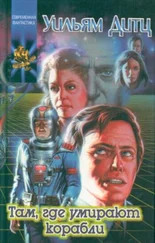
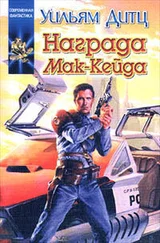
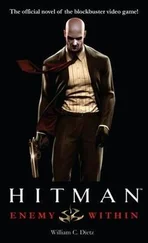
![Уильям Дитц - Избранные произведения в одном томе [Компиляция]](/books/389750/uilyam-ditc-izbrannye-proizvedeniya-v-odnom-tome-k-thumb.webp)
